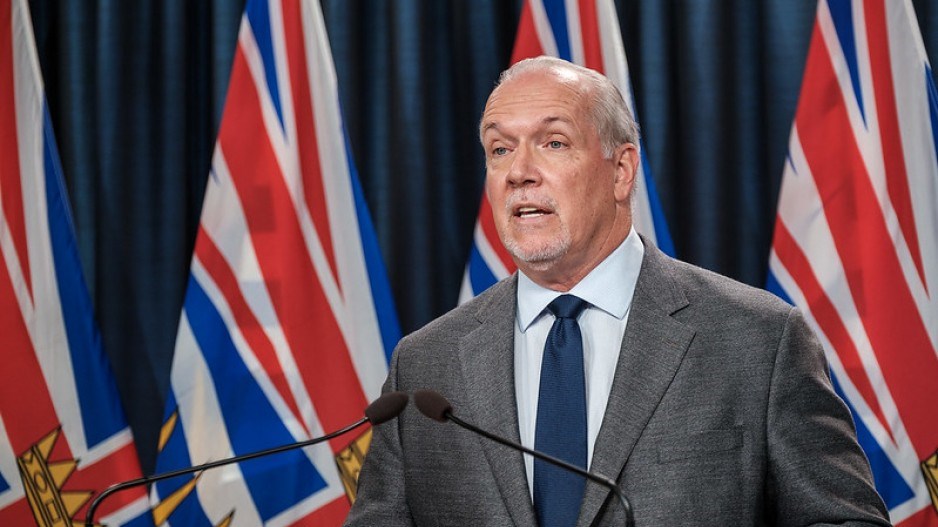Whether it is the delay in getting British Columbians vaccinated against COVID-19, a ban on cruise ships or a plan to put thousands of salmon farm workers out of a job in B.C., John Horgan’s provincial government is sometimes called on to answer for the policies of Justin Trudeau’s federal government.
The two don't always align. But when asked Wednesday about a number of federal policies that hurt B.C. businesses, Horgan was loath to criticize them overly much, since he generally agrees with some of them.
At a press conference Wednesday following a cabinet meeting, Horgan was asked about a number of federal policies that affect B.C. and its economy.
The Trudeau government’s failure to secure a sufficient supply of vaccines to meet the government’s own vaccination timelines has put B.C. behind in its planned vaccination schedule. The longer it takes for British Columbians to get vaccinated, the longer restrictions that put curbs on business will remain.
“We were hoping to be well-advanced at this point,” Horgan said. “Events beyond our control have put us back a little, but I have confidence that the commitments for Pfizer vaccines this and next week and beyond will get us on track.”
Horgan was asked about the federal government’s recent decision to extend a ban on cruise ships until February 2022, something that will hit tourism-dependent businesses and attractions hard, especially after government support programs run out.
Horgan generally supports the federal decision to continue to ban cruise ships from Canadian ports, though he seemed to question whether it needs to be extended into 2022.
“I’ll leave it to the federal government to explain why they took it all the way to 2022,” Horgan said. “That was their decision, not ours.”
Otherwise, he defended the decision to keep cruise ships out of B.C. ports.
“I know that this is a big blow for Victoria and parts of Vancouver and even up-island and beyond into Prince Rupert and Alaska,” Horgan said. “But I’m confident, if you talk to the vast majority of people in Victoria, they would be hailing this decision.”
Reopening the economy and borders won’t depend just on how many British Columbians get vaccinated or how successful the province is in bending the virus transmission curve – it will also depend on the progress other counties make.
“We would not be comfortable, as a community, to welcome the world back to British Columbia till the world gets their act together when it comes to COVID-19,” Horgan said.
It’s been suggested that rapid-testing could be used to ensure tourism activities like cruises can be done safely. Horgan questioned that idea, saying there can be false-positives with rapid testing.
Some businesses and attractions in Vancouver and Victoria depend on cruise ships for much of their summer business. When existing government subsidies run out, some may have a hard time surviving 2021.
Horgan cited Butchart Gardens in Victoria as an example of the kind of attraction that depends heavily on foot traffic from tourism, and which could be hard hit by the extended ban on cruise ships. He said his government is considering special aid programs for them.
“These major attractions are not eligible for some of the small business grants that we have on the table,” Horgan said. “So we are looking at how we can help these larger businesses that are almost solely dependent on international travellers and the visitor economy.”
Horgan was asked about another federal policy that will have a major impact in B.C., especially in coastal communities like Campbell River and Port Hardy: The federal government’s decision to shut down all open-net salmon farms in the Discovery Islands by June 2022.
Phasing out fish farms is not something Horgan’s government necessarily disagrees with. But Horgan did question the way in which the federal fiat came down in December – without warning or consultation.
He said his government had worked in consultation with industry, First Nations and environmental groups on a provincial plan to gradually phase out open-net salmon farms in B.C., starting with the Broughton Archipelago.
“The federal government took action in Discovery without consulting us at all,” Horgan said. “They told us after the fact.”
Horgan’s government has not exactly kicked up a fuss about the federal decision, however. His government’s main concern isn’t necessarily the phase-out of fish farming in B.C. per se, but rather the lack of a federal employment transition plan.
“We want to make sure that, as we transition from one industry to another, that there are programs in place to help workers,” Horgan said. “That, in this case, is the responsibility of the federal government, and they need to step up. I made that clear to them.”




